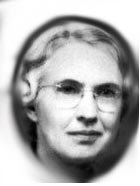AN UNFORGETABLE PERSON
Mary Lydia Tabor overcame two huge obstacles in early life which tell much about her character and personality. Born in a backwoods cabin in the mountains of western North Carolina in 1891, she knew the hardship of the mountain people's struggle for survival. The southern Appalachians were then thirty to forty years behind the rest of the country in civilization's march of progress. At the turn of the century there were no paved roads in the Brush Creek community, no electricity or telephones, no plumbing, and limited schooling. Most young girls married young, had large families, had a weathered look at forty, and died not long after.
